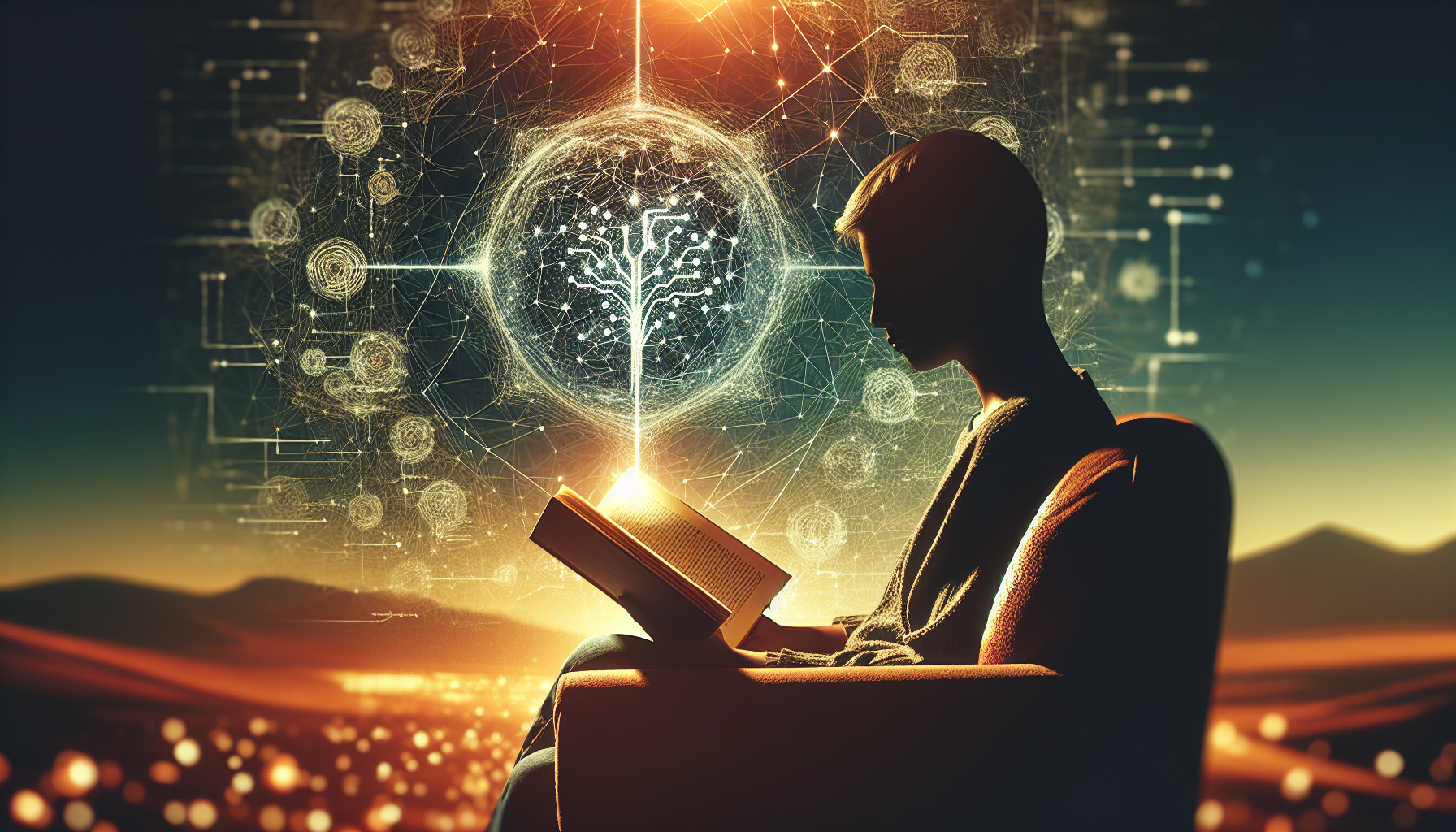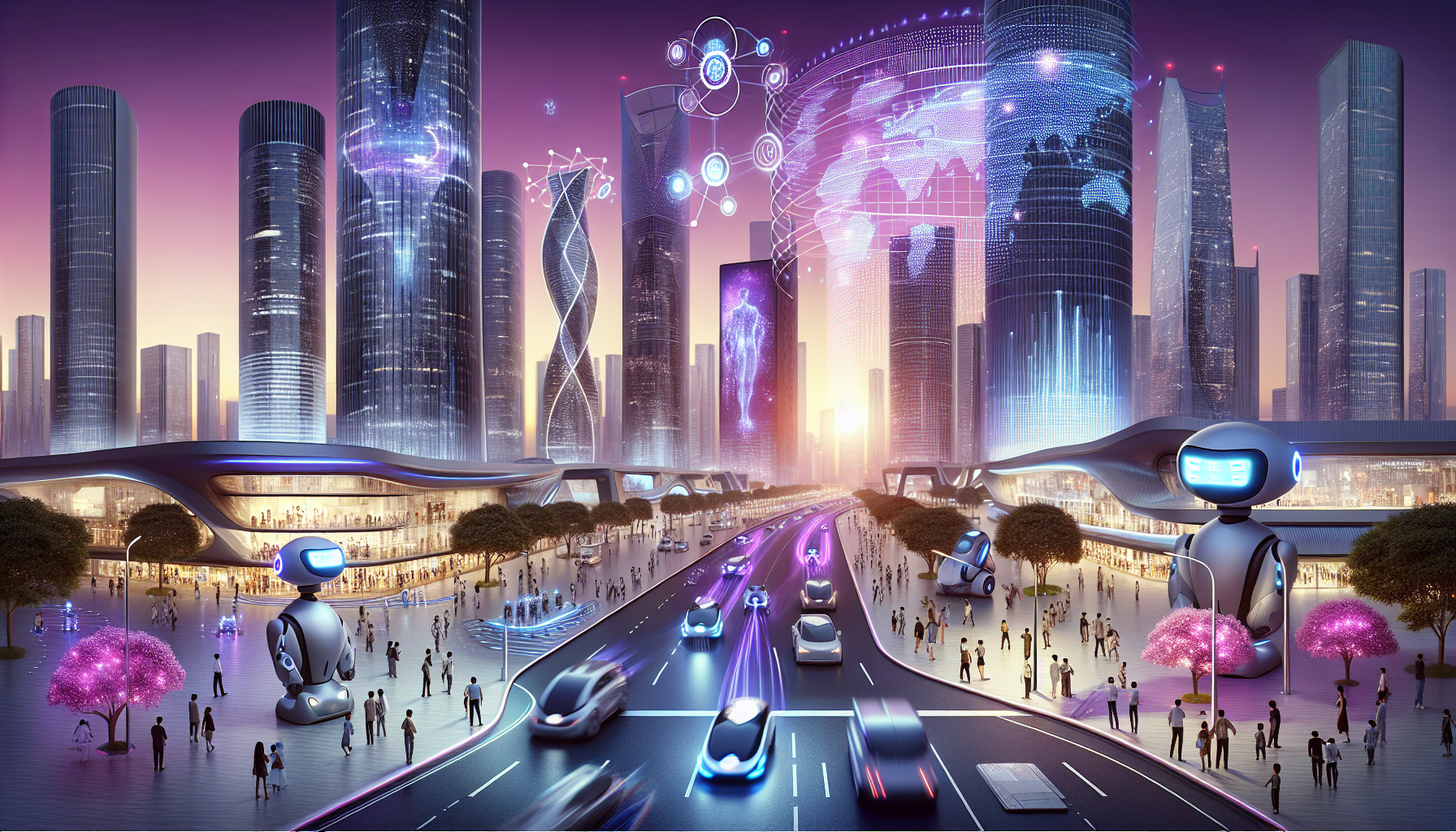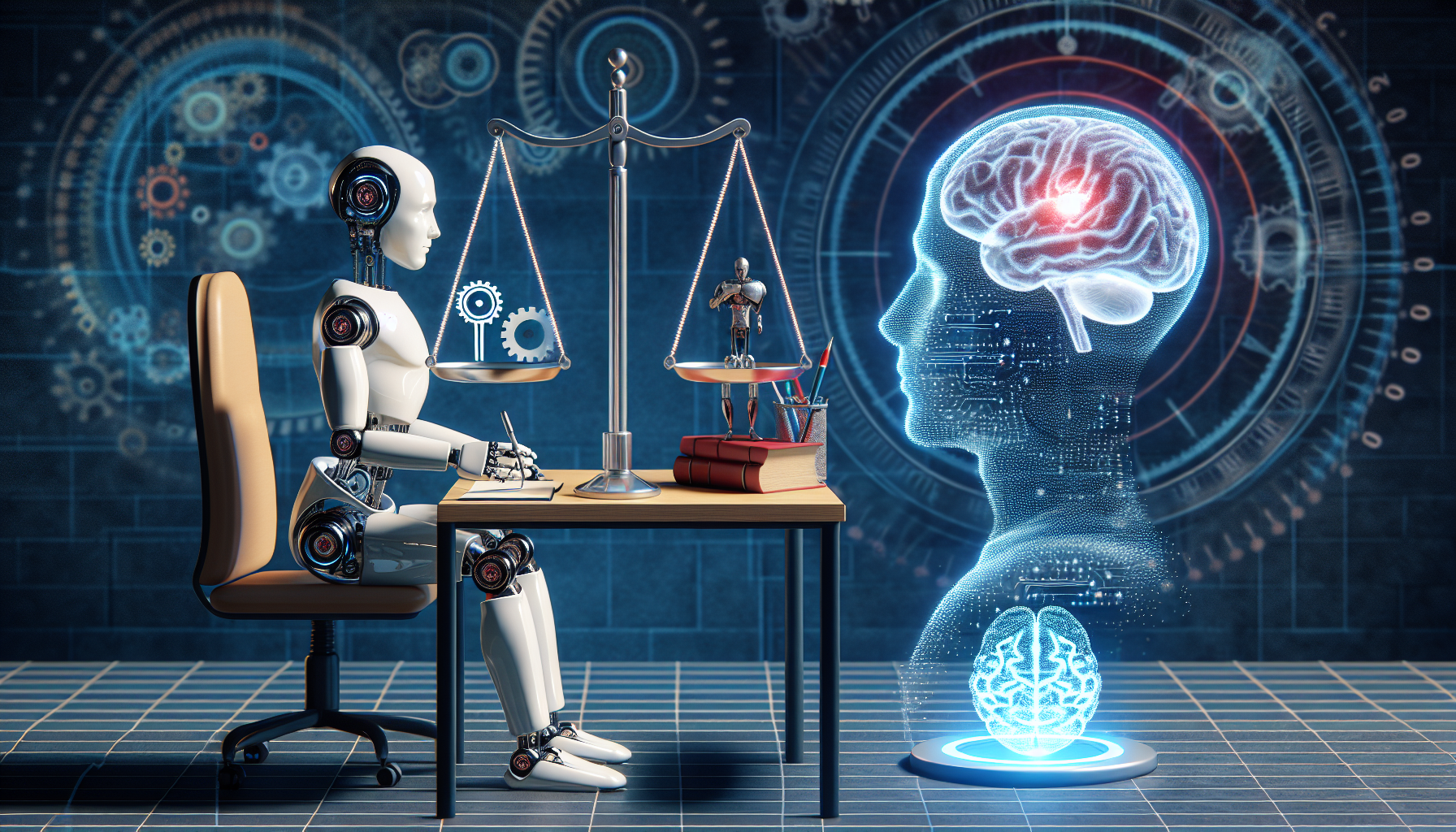Books on Artificial Intelligence provide an invaluable source of understanding into the complex nature of AI and its potential implications for society. From experts to casual readers, these best AI books present a fascinating look into this world filled with intelligence. They give us insights and information needed in order to comprehend the subject fully – helping unlock new ideas while expanding knowledge about artificial intelligence as a whole.
Key Takeaways
A wide range of AI books caters to different knowledge levels, from beginner guides offering fundamental understanding to advanced texts exploring the implications and future of AI.
Intermediate and specialized literature covers programming for AI and its applications in various domains like healthcare, finance, and education, alongside potential ethical implications.
Advanced AI concepts, ethical considerations, and the broader societal impact of AI are discussed in depth by experts, while fictional narratives offer creative interpretations of the implications of AI on future societies.
Essential Reads for AI Newcomers

Books offering an introduction to AI are a great way for those who want to start learning about it. From basic concepts through getting insights into possible uses, they provide the perfect opportunity for individuals interested in exploring artificial intelligence.
“AI for Beginners: Unlocking the Future with Artificial Intelligence”
Understanding key concepts and potential AI applications for the future is made simpler in “AI for Beginners: Unlocking the Future with Artificial Intelligence,” a highly recommended read. This book provides illustrations of practical solutions, introduces machine learning algorithms as well as deep learning technologies and offers instructions on creating predictive models.
“Artificial Intelligence For Dummies (For Dummies (Computer/Tech))”
John Paul Mueller’s “Artificial Intelligence For Dummies” provides a non-technical overview of AI, making the underlying algorithms simple to comprehend. The book is tailored for newbies who are keen on getting an example based understanding of how intelligence works and operates in Artificial Intelligence systems.
Through his practical applications and demonstrations, he outlines the significance data plays when it comes to learning processes or decisions being made with regards to AI.
“Simply Artificial Intelligence (DK Simply)”
Penguin Random House’s book “Simply Artificial Intelligence (DK Simply)” is the perfect choice for those wanting a visually stimulating introduction to AI. This engaging read combines captivating visuals and simple language to explain AI-related technologies, making it an enjoyable way into this subject matter.
It covers many aspects of artificial intelligence, from reinforcement learning through computing and mathematics, all the way up to political philosophy and historical research about this field of knowledge.
Navigating the AI Landscape: Intermediate Literature

For readers developing their understanding of AI, there is a variety of intermediate material to provide Detail on topics such as programming, generative AI and modern approaches. This helps broaden their comprehension in this field.
“Artificial Intelligence: A Modern Approach, Global Edition”
This modern approach to Artificial Intelligence (AI), written by global authors Stuart J. Russell and Peter Norvig, has become a widely-used textbook covering AI concepts, techniques and real world applications that have earned positive reviews from readers.
It encompasses topics such as intelligent agents, knowledge representation algorithms for problem solving and search processes, planning abilities, machine learning principles like natural language processing along with computer visioning technologies. Robotics implementations too, all of which are explored in regards to their practical uses but also ethical considerations when using them in the wider world.
“Machine Learning for Coders: A Programmer’s Guide to Artificial Intelligence”
For those interested in artificial intelligence and AI programming, Laurence Moroney’s “Machine Learning for Coders: A Programmer’s Guide to Artificial Intelligence” provides a comprehensive overview.
The book explores the fundamentals of Machine Learning, instructing readers on how to construct models with TensorFlow as well as teaching them about core ML concepts such as computer vision, NLP (Natural Language Processing) and embedding models into Android systems.
“Artificial Intelligence & Generative AI for Beginners: The Complete Guide”
This guide presents a comprehensive understanding of Artificial Intelligence and Generative AI to readers. From machine learning, neural networks to generative AI’s practical uses, it offers an insight into the future implications of intelligence.
With this book as their resourceful tool for beginners in mind, readers can anticipate what may be possible with using these advanced techniques powered by artificial intelligence.
Expert Insights into Advanced AI Concepts

Written by experts on artificial intelligence, AI books provide valuable insights into the capabilities and potential effect of AI for business leaders. Those who have an extensive knowledge in this area can use these resources to gain Understanding beyond basic concepts about its limits and how it may impact society.
“Life 3.0: Being Human in the Age of Artificial Intelligence” by Max Tegmark
Max Tegmark’s “Life 3.0: Being Human in the Age of Artificial Intelligence” examines how AI may affect society and our future, considering both potential benefits and drawbacks associated with its implementation. He has laid out a variety of possible situations to provide an extensive look at what we can expect from this rise in intelligence technology’s influence on life as we know it.
“Human Compatible: Artificial Intelligence and the Problem of Control” by Stuart Russell
Stuart Russell’s book “Human Compatible: Artificial Intelligence and the Problem of Control” sheds light on the importance of regulating AI systems, especially when it comes to their potential impact on humanity.
It is crucial that a system must be in control if an artificial intelligence wants to live harmoniously with humans. This implies defining proper objectives for AI. Many practitioners oppose regulation due to fear towards advanced Superintelligent AIs (ASI).
“The Myth of Artificial Intelligence: Why Computers Can’t Think the Way We Do”
In his book, “The Myth of Artificial Intelligence: Why Computers Can’t Think the Way We Do,” Erik J. Larson questions the idea that computers possess human-like intelligence, which some computer scientists believe in.
He argues that humans rely on their own neural work and perform abductive reasoning to make informed conjectures while AI operates by only carrying out data correlation processing – differentiating it from humans’ ability for original thought processes unlike machines.
Specialized AI Domains: Healthcare, Finance, and Education

This exploration looks at books that reveal AI’s potential to revolutionize healthcare, education and finance. By studying these titles, we are better able to understand the opportunities associated with this technology in various specialized domains.
“Artificial Intelligence and Its Transformative Impact on Healthcare”
This book delves into the transformation of healthcare through artificial intelligence, particularly its ability to improve patient care and decisions made within medical institutions. “Artificial Intelligence and Its Transformative Impact on Healthcare” also looks at potential ethical issues surrounding AI’s integration in such settings.
The text examines how this technology is playing an increasingly important role when it comes to harnessing intelligent systems for improved results in medicine. It explores the far-reaching implications of using AI solutions across different areas related to health as well.
“Foundations of Artificial Intelligence Finance: Modern Finance in the 21st Century”
The book “Foundations of Artificial Intelligence Finance: Modern Finance in the 21st Century” examines how AI technology is transforming modern finance, with a special focus on asset pricing and portfolio management. Exploring the advancement of artificial intelligence within this industry, it demonstrates its potential to revolutionize traditional financial practices.
“The AI Classroom: The Ultimate Guide to Artificial Intelligence in Education”
This guide, “The AI Classroom: The Ultimate Guide to Artificial Intelligence in Education” looks at how Artificial Intelligence can be used to advance teaching practices and examines the potential of AI-based learning tactics. It provides useful insights on combining various technologies powered by intelligence into educational methods.
AI Ethics and the Future: A Responsible Approach

This section aims to investigate books which encourage a responsible attitude in the development of AI and raise awareness about ethical implications on society. We will be looking into how Artificial Intelligence has great potential but also presents some serious considerations that must be taken into account.
“Artificial Intelligence: Bliss or Peril for Future Humanity?”
This article dives into the discussion of artificial intelligence and its possible effect on life as we know it. It looks at both sides, such as AI potentially being an invaluable technology to support humanity’s development or carrying the risk of negatively impacting our future existence.
To ensure a safe progression for humans in this new era, understanding how to strike a balance between utilizing intelligent machines while avoiding potential dangers is paramount when considering their effects over time.
“Our Final Invention: Artificial Intelligence and the End of the Human Era”
James Barrat’s “Our Final Invention: Artificial Intelligence and the End of the Human Era” warns that, if AI is not held in check, it may mark an end to humanity as we know it. He paints a grim portrait for what could happen when machine intelligence surpasses human capability without proper regulation.
In light of this potential threat posed by artificial intelligence development exceeding our own understanding of intelligence (human or otherwise), he suggests caution about what lies ahead on our path towards technological progress.
“2084: Artificial Intelligence and the Future of Humanity”
John Lennox’s book, “2084: Artificial Intelligence and the Future of Humanity”, investigates how AI may influence our lives in the future. The text presents an insightful analysis of what this increased level of intelligence could mean for society as a whole, providing readers with an easily understandable exploration into its possible impacts.
AI in Fiction and Popular Culture
This section will investigate books that delve into AI, allowing for a creative look at the topic through fictional stories and popular culture. Non-fiction titles offer informative insights on Artificial Intelligence. Fiction enables an imaginative exploration of the subject as well.
“AI 2041: Ten Stories of Our Future”
In “AI 2041: Ten Stories of Our Future,” written by Kai-Fu Lee and Chen Qiufan, the authors explore a world in twenty years’ time that has been shaped by AI through ten imaginative science fiction stories. Each story considers an individual aspect of AI technology from its future implications to how it may impact our lives. Offering unique insights into what this promising science could bring us.
“Flowers for Algernon”
Daniel Keyes’ novel “Flowers for Algernon” is a famous story about an individual whose mental capacity has been artificially augmented. As the main character deals with his elevated intelligence, readers are encouraged to ponder over the ethical and social implications of artificial enhancement of cognitive ability.
Wrapping up
Books mentioned in this post provide a comprehensive understanding of Artificial Intelligence, from the basics to its effect on our society. They create an accessible roadmap for all levels- newcomers, experts and those just interested in learning more about this rapidly evolving technology alike.
Frequently Asked Questions
Which is best artificial intelligence book?
For anyone wanting to learn about artificial intelligence (AI), it is essential to have the best AI book for beginners. This will provide a great starting point and aid in mastering this increasingly important area of knowledge.
Does Amazon allow AI generated books?
Amazon has issued a new policy that requires publishers to provide details of any artificial intelligence (AI) used in the content submitted via KDP, including AI-generated text, graphics and translations. This is done with an intention to check unlawful employment of Artificial Intelligence for publishing purposes. The idea behind this mandate is to prevent illegitimate use of AI during book production processes.
Is there an AI that can read?
AI technologies such as PDFgear can assist in making the learning process interactive and easy to understand by having the capability of accurately processing and understanding PDF documents. With these tools, all of the information remains intact while allowing users to access it efficiently.
Has an AI written a book?
An Artificial Intelligence has composed books using the char-rnn-tensorflow language model created by Andreas Refsgaard and Mikkel Thybo Loonen. This AI system is capable of writing entire books, demonstrating its potential for creativity and innovation within literature.
What is a good introductory book for someone new to AI?
This book, “AI for Beginners: Unlocking the Future with Artificial Intelligence” is widely acclaimed and provides an essential comprehension of AI. It serves as a great starting point to learn about this technology that will shape our future.

Leave a Reply